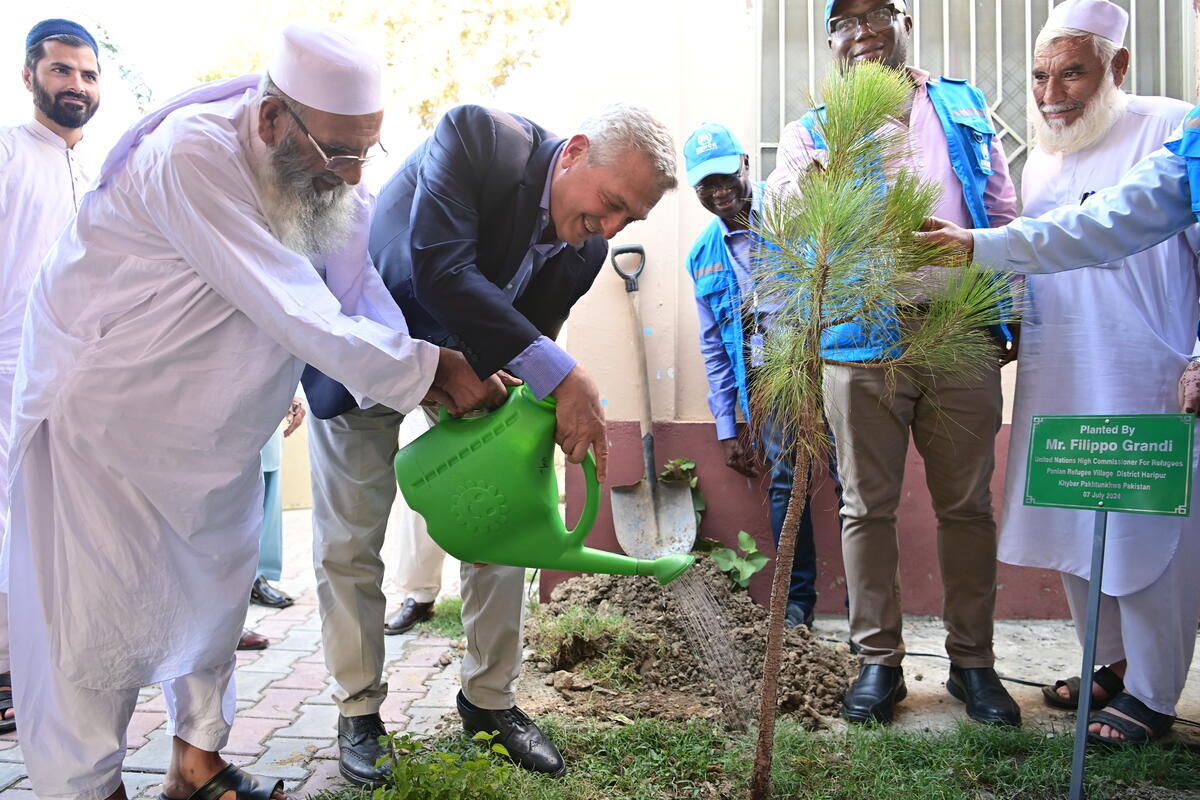Afghanistan Humanitarian Update No. 39
Afghanistan Humanitarian Update No. 39
At a Glance:
- New arrivals in Pakistan report many thousands in Afghan border camps
- Discussions planned to ease transfers to Roghani camp
- New camps opening in Pakistan
- UNHCR Emergency Coordinator returns from Kabul
- UNHCR working in Afghanistan, more offices looted
- Largest weekly return from Iran this year
New arrivals report many thousands in Afghan camps
Newly arrived Afghan refugees in the southern Pakistan province of Baluchistan indicate there are up to 60,000 displaced people in three large tent camps in the Spin Boldak area of south-eastern Afghanistan, opposite Pakistan's Chaman border crossing. The three camps in Taliban-controlled territory have a total of between 11,000 and 13,000 tents. The largest camp is Rabita Alam el Islam, with 5,000 - 6,000 tents, followed by Ben Rashid Maktum, with 4,000 to 5,000. The smallest is Al Rashid, with 2,000 - 2,500 tents. UNHCR estimates there are an average of five persons per tent. The newly arrived refugees said not all of the tents are being used at present, however. It is also unclear whether those in Spin Boldak want to cross into Pakistan, whose borders remain officially closed.
Meanwhile, the Chaman border crossing with Pakistan was reported quiet today, with very few people crossing.
Discussions planned to ease transfers to Roghani camp
UNHCR will begin consultations this weekend with the border authorities to discuss the possibility of directly transferring the newly arriving Afghan refugees at the Chaman border post to the new Roghani refugee camp, 16 kms away. If agreed, this measure will ease the pressure on the Killi Faizo staging camp at Chaman, which has reached full capacity despite the ongoing relocation exercise. More than 5,000 refugees are now in Roghani, but over 3,000 remain in Killi Faizo.
In an alarming piece of news from Roghani, four children have died over the past three days of diarrhoea. These are the first deaths since Roghani was set up. MSF, who have a clinic at the camp, are currently doing tests to establish what exactly caused the deaths. They are testing for various bacteria including the highly contagious shigella which causes bloody diarrhoea.
New camps opening in Pakistan
UNHCR and local authorities have agreed to open two new sites in Pakistan's North-West Frontier Province (NWFP) for use by new Afghan arrivals. The two new sites are in addition to Kotkai camp in Bajuar agency in NWFP, which has been receiving Afghans transferred from the squalid Jalozai site near Peshawar since Monday. Both of the new camps are in Kurram agency - Basu will house Shia Afghans, and Old Bagazai will accommodate Tajiks, Uzbeks and other Afghan minorities. The two sites can each hold up to 10,000 refugees.
On Thursday, UNHCR moved another 431 Afghans from Jalozai to Kotkai, bringing the total number of people in the new camp to 1,700. Also on Thursday, UNHCR staff in Peshawar began identifying collection points for recently arrived Afghan refugees willing to relocate to the three newly established camps (Kotkai, Basu and Old Bagazai).
UNHCR Emergency Coordinator returns from Kabul
UNHCR Regional Emergency Co-ordinator Filippo Grandi returned to Islamabad Thursday after five days in Kabul as part of the UN humanitarian mission in Kabul. While there, Grandi held a series of meetings with UNHCR national staff, who have been working under very difficult conditions, other UN agencies and NGOs.
UNHCR working in Afghanistan, more offices looted
UNHCR has re-established its international presence in Kabul and is planning to provide some of the devastated city's most needy displaced families with a cold-weather package consisting of quilts, sweaters, warm clothes for children, and stoves for heating and cooking to some of the most needy internally displaced families in Kabul. UNHCR is also re-activating quilt and sweater making projects in the city. On Wednesday, UNHCR, together with other agencies, distributed quilts, warm clothes and tents to 700 internally displaced people in a heavily-bombed part of Kabul.
Nearly 20 Afghan staff have now resumed work at the UNHCR office in Herat. The staff have reported the looting of a UNHCR field office in the town of Farah to the south-west. The incident raises more security concerns for the refugee agency, which is considering deploying staff, security permitting, to its field offices in Farah and in Islam Qala on the border with Iran. The Farah office, which was shared with other UN agencies, reportedly was looted in the last few days. UNHCR has also learned that its office in Khost in Paktia province has been looted.
UNHCR field staff have received reports of more than 50,000 people living in dire conditions in a camp outside the town of Farah. They were told that there are no relief agencies currently working in the camp. UNHCR's priorities in western Afghanistan include the rapid assessment of needs in the region as well as the resumption of quick impact projects that would help stabilize returning populations from neighbouring countries, particularly Iran, and from other areas inside Afghanistan.
Aid workers say that every day hundreds of people continue to flock into the crowded Maslakh camp near Herat from Ghor Province in central Afghanistan. The daily influx into the camp further heightens the already-pressing need for more assistance to the camp. UNHCR is making arrangements for a second relief convoy to be sent from Mashad. The first convoy arrived in Herat on Thursday.
In the meantime, 600 UNHCR winterized tents were supplied to needy families in Maslakh camp. Another 400 tents will be distributed from stocks in Herat.
Largest weekly return from Iran this year
A total of 5,807 Afghans have returned home from Iran this week alone, the highest weekly return figure this year. The week's returns bring to 43,693 the number of Afghans who have spontaneously returned from Iran to their war-ravaged country since September 11.








